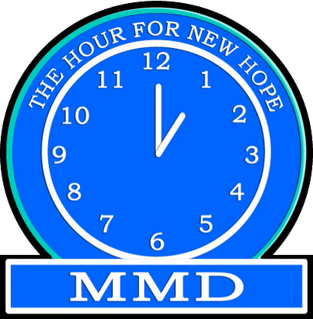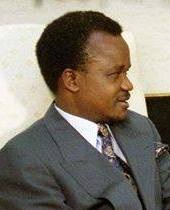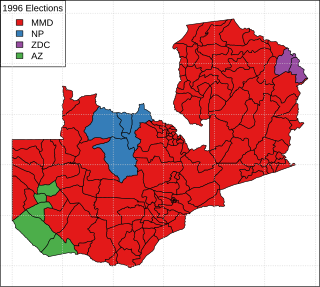
Kenneth Kaunda, also known as KK, was a Zambian politician who served as the first president of Zambia from 1964 to 1991. He was at the forefront of the struggle for independence from British rule. Dissatisfied with Harry Nkumbula's leadership of the Northern Rhodesian African National Congress, he broke away and founded the Zambian African National Congress, later becoming the head of the socialist United National Independence Party (UNIP).

The history of Zambia experienced many stages from colonisation to independence from Britain on 24 October 1964. Northern Rhodesia became a British sphere of influence in the present-day region of Zambia in 1888, and was officially proclaimed a British protectorate in 1924. After many years of suggested mergers, Southern Rhodesia, Northern Rhodesia, and Nyasaland were merged into the British Federation of Rhodesia and Nyasaland.

The politics of Zambia takes place in a framework of a presidential representative democratic republic, whereby the president of Zambia is head of state, head of government and leader of a multi-party system. Executive power is exercised by the government, while legislative power is vested in both the government and parliament. Formerly Northern Rhodesia, Zambia became a republic immediately upon attaining independence in October 1964.

The Movement for Multi-party Democracy (MMD) also known as New Hope MMD is a political party in Zambia. Originally formed to oust the previous government, MMD controlled an absolute majority in parliament between 1991 and 2001, when its past leader, Frederick Chiluba was President of Zambia. Its election into power in 1991 ended the 27-year rule of President Kenneth Kaunda and his United National Independence Party (UNIP). It remained the dominant party within Zambian politics until the general elections of September 2011.

The president of the Republic of Zambia is the head of state and head of government of Zambia and is the highest executive authority in the country. The president is elected by popular vote for a five-year term and is responsible for the administration of the government, overseeing the implementation of national policies, and representing Zambia in international affairs. The office was established at Zambia's independence in 1964. The current president is Hakainde Hichilema, who assumed office on August 24, 2021, following the 2021 presidential election where his party, the United Party for National Development, won a majority. The president's role includes appointing the Cabinet, serving as Commander-in-Chief of the Zambian Defence Force, and ensuring the enforcement of laws.

The United National Independence Party (UNIP) is a political party in Zambia. It governed the country from 1964 to 1991 under the socialist presidency of Kenneth Kaunda, and was the sole legal party in the country between 1973 and 1990. On 4 April 2021, Bishop Trevor Mwamba was elected President of UNIP.

Elections in Zambia take place within the framework of a multi-party democracy and a presidential system. The President and National Assembly are simultaneously elected for five-year terms.
Mainza Mathias Chona was a Zambian politician and founder of UNIP who served as the third vice-president of Zambia from 1970 to 1973 and Prime Minister on two occasions: from 25 August 1973 to 27 May 1975 and from 20 July 1977 to 15 June 1978.
Simon Mwansa Kapwepwe was a prominent Zambian politician, anti-colonialist, and author, born on April 12, 1922. Kapwepwe made significant contributions towards Zambia's struggle for independence, working tirelessly towards achieving the country's liberation from colonial rule.

General elections were held in Zambia on 28 September 2006 to elect a President, members of the National Assembly and local government councillors. The result was a victory for the ruling Movement for Multi-Party Democracy, which won 75 of the 150 National Assembly seats and whose candidate, Levy Mwanawasa, won the presidential vote. Voter turnout was just over 70%.
Tilyenji Kaunda is a Zambian politician. Until 5 April 2021 he served as leader of the United National Independence Party (UNIP)
Enoch P. Kavindele is a Zambian businessman and politician who served as the seventh vice-president of Zambia from 2001 until 2003.

General elections were held in Northern Rhodesia on 20 and 21 January 1964. There were two voter rolls for the Legislative Council, a main roll that elected 65 seats, and a reserved roll that elected 10. Africans elected the main roll, whilst Europeans elected the reserve roll. Other ethnicities were allowed to choose which roll to be part of. The United National Independence Party won the elections, taking 55 of the common roll seats. Its leader, Kenneth Kaunda became Prime Minister, leading the country to independence in October that year, at which point he became President. Voter turnout was 94.8% for the main roll and 74.1% for the reserved roll.

General elections were held in Zambia on 19 December 1968 to elect the National Assembly and President. The first post-independence polls saw incumbent Kenneth Kaunda retain his post as president, whilst his United National Independence Party, the only party to field candidates in all 105 constituencies, won 81 of the 105 seats in the National Assembly. Voter turnout was 82.5% in the parliamentary election, but 87.1% in the presidential election.

General elections were held in Zambia on 5 December 1973. They were the first elections held since the country was formally declared a one-party state in August, with the United National Independence Party (UNIP) as the only legally permitted party. UNIP leader Kenneth Kaunda was automatically elected to a third five-year term as President, and was confirmed in office via a referendum in which 88.8% of voters approved his candidacy. UNIP also won all 125 seats in the National Assembly. Voter turnout was 39% of the 1,746,107 registered voters for the presidential election, and 33% for the National Assembly election.

General elections were held in Zambia on 12 December 1978. At the time, the country was a one-party state with the United National Independence Party (UNIP) as the sole legal party. UNIP leader Kenneth Kaunda was automatically elected to a fourth five-year term as President, with 80.7% of voters voting to confirm him in office. UNIP also won all 125 seats in the National Assembly. Voter turnout was around 65% in the parliamentary election, but 66.7% in the presidential election.

General elections were held in Zambia on 26 October 1988. At the time, the country was a one-party state with the United National Independence Party (UNIP) as the sole legal party. UNIP leader Kenneth Kaunda was automatically re-elected for a sixth five-year term as President with 95.5% of the vote, whilst UNIP also won all 125 seats in the National Assembly. Voter turnout was around 60% in the parliamentary elections, but 58.8% in the presidential elections.

General elections were held in Zambia on 31 October 1991 to elect a President and National Assembly. They were the first multi-party elections since 1968, and only the second multi-party elections since independence in 1964. The United National Independence Party (UNIP), which had led the country since independence, was comprehensively beaten by the Movement for Multi-Party Democracy (MMD). Kenneth Kaunda, who had been president since independence, was defeated in a landslide by MMD challenger Frederick Chiluba in the presidential elections, whilst the MMD won 125 of the 150 elected seats in the expanded National Assembly. Voter turnout was 45%.

General elections were held in Zambia on 18 November 1996 to elect a President and National Assembly. They were boycotted by the main opposition party, the United National Independence Party, together with five other allied parties, following changes to the constitution which they failed to have reversed following a court challenge. The changes imposed a two-term limit on the presidency, required presidential candidates to be born to two Zambian citizens by birth or descent, and required National Assembly candidates to give up their chieftaincy. UNIP believed these changes were specifically aimed at their longtime leader, Kenneth Kaunda, whose parents were Malawian and had previously served as the country's first president from 1964 to 1991. The changes would have also excluded UNIP's vice president, a chief. Subsequently, the ruling Movement for Multi-Party Democracy won a comfortable victory in both elections, taking 131 of the 150 elected seats in the National Assembly, and its candidate, Frederick Chiluba, winning 73% of the vote in the presidential election.

General elections were held in Northern Rhodesia on 30 October 1962, with by-elections for several seats held on 10 December. Although the United Federal Party won the most seats in the Legislative Council, and Northern Rhodesian African National Congress leader Harry Nkumbula had made a secret electoral pact with the UFP, Nkumbula decided to form a government with the United National Independence Party.















